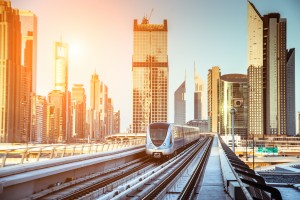Tim Armsby, Partner at Eversheds on trends and challenges in the Middle East’s infrastructure development
Eversheds worked with RTA (Roads and Transport Authority, Dubai) over a period of six months to assist in negotiations with the operator under an O&M concession to extend the term of the contract. Because it was a live agreement this made the negotiations especially challenging but still significant changes to the contract as well as cost savings, were achieved.
The work involved reviewing international benchmarks, updating and restating the concession to take into account best practice in metro operations, in particular in relation to key performance indicators and reporting and maintenance obligations. We worked closely with the clients’ rail team and operations and maintenance department to draft in these requirements.
Following the initial work, Eversheds was also employed to advise the client in relation to potential extensions to the Red and Green lines of the Dubai Metro. The client is considering different options for financing the extensions, including purchase of rolling stock, and we are advising on the feasibility of developing transit oriented developments to capitalise on the value of its real estate assets.

Could you tell us about the work of Eversheds in the Middle East?
We are a full service law firm working across the region from seven offices as well as our relationship firms elsewhere. I lead our energy and infrastructure team in the region working on transactions in the oil and gas, power, water, transport, education and other sectors. Our work covers the full spectrum of legal work including commercial contracts, EPC, O&M, concessions, and finance documents.
What are some of the key trends you have noticed in the infrastructure sector in the region?
Conventional power and water projects continue to be a significant sector in the region but renewable energy has been a key growth sector recently and we only see this becoming more important. We were recently awarded MENA law firm of the year in the annual MESIA awards which is an industry body focussed on solar. Transport continues to be an important area and obviously real estate is back in growth mode too. The decline in oil prices has had an impact on some downstream projects but we are still seeing investment at the upstream end all be it on a more conservative scale.
What role do conferences and exhibitions like Middle East Rail play in developing the infrastructure sector?
It is a key event from a networking perspective. It is always good to learn more about schemes in the pipeline but this is a really important event for engaging with the decision makers and intermediaries working in this sector.
In terms of legal counsel, how is it different working in the Middle East compared to the West?
I have spent 15 years working in the region now and the key for me is that you often get involved in assisting them in considering commercial decisions. You tend to have much greater engagement with clients and the projects and that makes the work interesting. I have never done the same thing twice in my time living and working here which makes the work constantly challenging which I enjoy.
In terms of infrastructure (especially railway), what are some of the challenges faced in the region?
The big challenge is that you are often doing something for the first time – this requires additional preparation and engagement with stakeholders to ensure success. This means building additional time into the schedules that may include hard dates, for example connect with other transport infrastructures.
Which country in the Middle East looks most promising in terms of infrastructure development?
There continues to be significant development in the UAE but other countries such as Qatar, Kuwait and Egypt are entering significant growth phases. The reasons for development in Qatar are well known. In Kuwait they have recently issued a new PPP law and have a large pipeline of projects. Egypt is a place I know well having spent 7 years living and working there and the pipeline of projects is huge. If even 10 percent proceeds it will make a massive difference.
Could you tell us more about your work with the Nile River Bus in Egypt?
This is a really interesting project. I worked on a number of PPPs during my time there and am really happy to be working on this one. It aims to develop a new water bus scheme on the Nile in the heart of Cairo. As someone who used to commute down the Corniche every day I can tell you that this will make a major difference to the transport options in the city.












